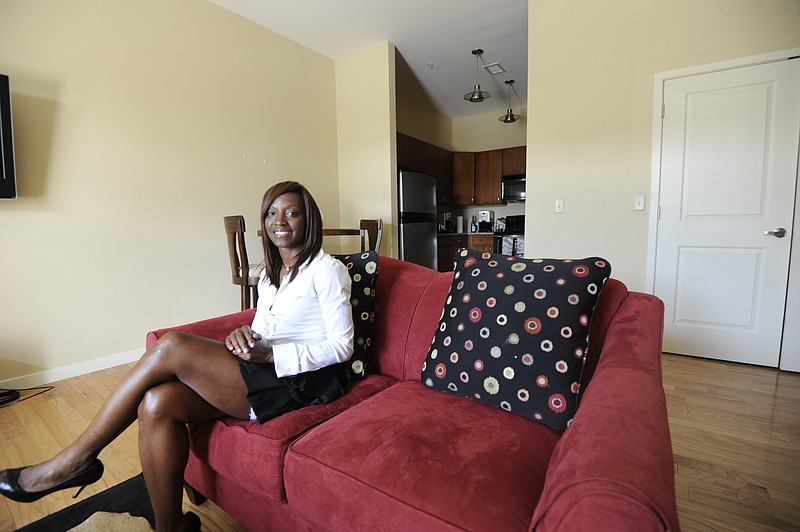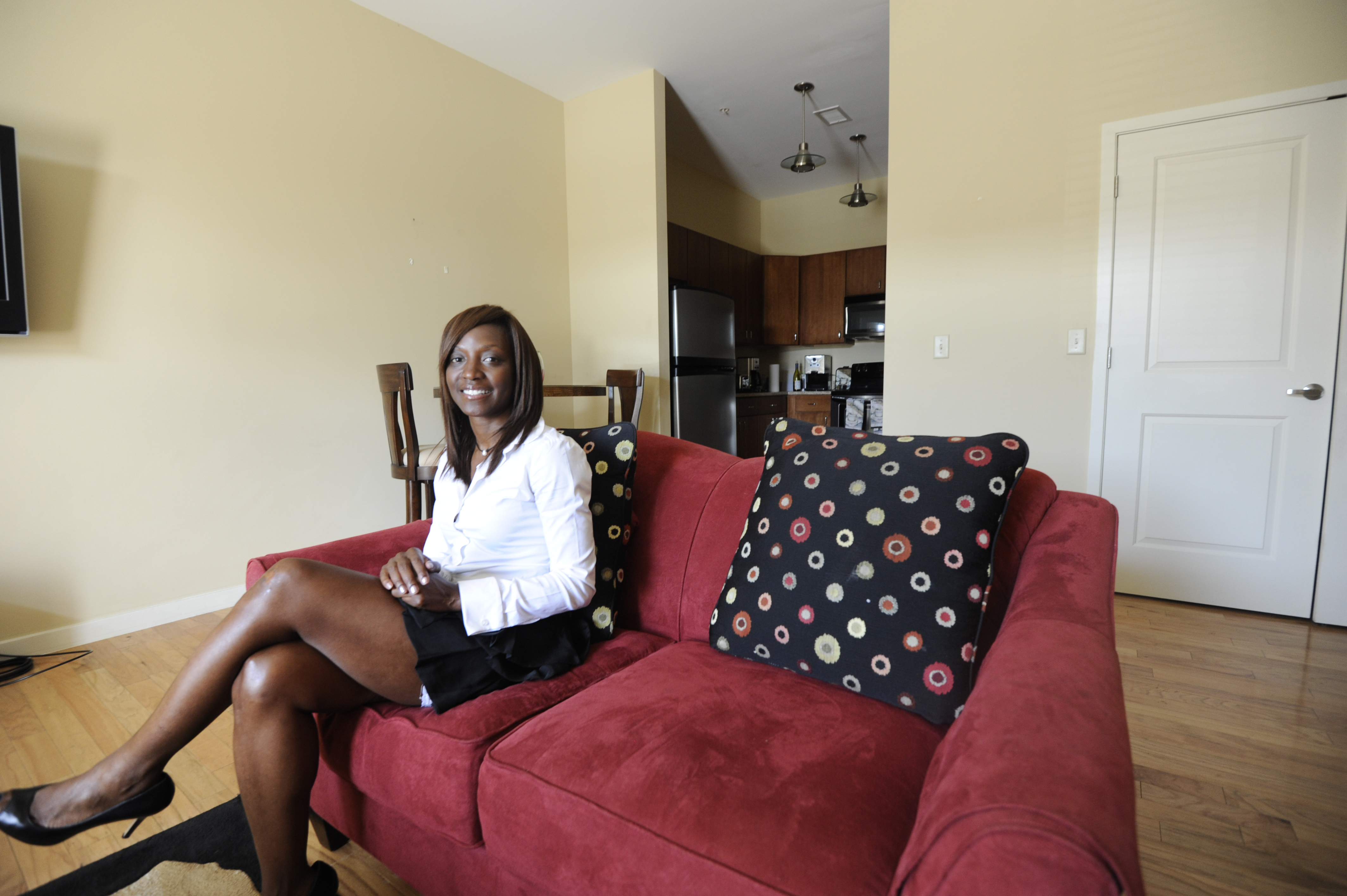For Pamela Sheats, realizing the American dream of home ownership started with a home buying and maintenance class from Chattanooga Neighborhood Enterprise in the 1990s.
A dozen years and three moves later, Sheats credits that class and other help from CNE for helping her to buy and sell homes in St. Elmo and Harrison before purchasing what she says is her ideal current home downtown four years ago.
"With CNE's help I was actually able to buy my first home with a mortgage that ended up costing me $10 a month less than what I was paying in rent," Sheats said. "A lot of people should take note of that right now with the housing prices down and rent prices going up."
Sheats, who works at TVA within a five-minute drive from her Flynn Street condo, has used CNE for education, down payment assistance, neighborhood relocation incentives and help with mortgages.
"I wouldn't be where I am today without CNE," she said.
Sheats is among nearly 10,000 Chattanooga-area residents who have used CNE services since the nonprofit organization was launched in 1986. Although the agency was forced to restructure and limit some of its programs four years ago, CNE still made more than 150 loans for down payment assistance or other home purchase assistance in 2010.
Collectively, those loans were worth more than $14 million for home purchases and renovations.
Chasing the American Dream
CNE was launched and sustained with contributions from local foundations and banks and grants from city and federal governments through a public-private partnership that brought bankers and government leaders together.
The agency began with a bold vision to promote home-ownership and eliminate substandard housing in Chattanooga within a decade.
Twenty-five years later, the 56 percent homeownership rate in the city trails the 67 percent nationwide average for homeownership, according to data from the U.S. Census Bureau. Many also still complain about substandard housing in the city.
But CNE has won national acclaim through the years for helping to rebuild many inner-city neighborhoods, including the area around UTC where Sheats moved when the CNE-backed condos were built in 2007.
"CNE was the model for neighborhood renovation in the country," said David Johnson, a former mortgage banker and nonprofit agency director in Columbus, Ga., who first came to CNE during a visit 11 years ago to find out more about the pioneering program.
Johnson, who ultimately was hired as CNE's president nearly three years ago, said its diverse education, loan, weatherization and counseling programs are designed to help people to buy and stay in their houses.
"This is about promoting and preserving the American dream and helping generations of renters to become homeowners to build their own wealth," he said.
A mission at Home
The idea for CNE was spurred by a talk Maryland developer James Rouse gave in Chattanooga in the mid-1980s about the value of promoting homeownership. Rouse, who after developing suburbia with housing and shopping mall projects refocused in his later years on inner-city projects, urged Chattanooga to reclaim its inner-city neighborhoods and dream big about ending substandard housing.
Bob Corker, then a Chattanooga builder and developer who had just returned from a mission trip to Haiti, seized upon the vision and began pushing for a public-private partnership to tackle housing problems. Corker, who went on to become Chattanooga mayor and one of Tennessee's U.S. senators, was CNE's first chairman.
The Lyndhurst Foundation committed $1 million toward CNE to be matched by $2 million from Chattanooga's operating funds. CNE also secured other federal aid and became the nation's first nonprofit FHA direct endorsement lender.
Chattanooga Neighborhood Enterprise adopted part of Rouse's "Enterprise" company name and Corker immediately brought together bankers and housing officials to start CNE with a bold vision to eliminate substandard housing in Chattanooga.
"We wanted to dream big, especially at a time when Chattanooga was really on its back economically," former Chattanooga Mayor Gene Roberts said.
CNE was among a host of initiatives spurred by a community visioning process in the 1980s organized by Chattanooga Venture and backed by the city's top business guns.
CNE was not just trying to provide an alternative for public housing or to assume the role of the Chattanooga Housing Authority, CNE board member and former City Council member Mai Bell Hurley said.
"Homeownership is the key to stable neighborhoods," Hurley said. "If you own your own home, you are more likely to maintain the property and to be a part of the community."
Rebuilding city neighborhoods
CNE moved into neighborhoods often overlooked by conventional banks and offered homeownership counseling and government-backed loans at a time when other mortgage lenders did not, at least in many inner-city neighborhoods.
"CNE was fulfilling a need that wasn't being fulfilled by anyone else," said Ric Ebersole, a Chattanooga developer who is chairman of CNE.
Over time as the housing market thrived before and after the start of the 21st century, other lenders began making loans to nearly everyone anywhere, confident that home values would continue to appreciate.
At CNE, Ebersole and Hurley said the agency maintained its lending criteria and, combined with its homeownership counseling, has had relatively few foreclosures compared with the market as a whole.
"I think if more people had gone through CNE's homeownership training, we wouldn't have had such a mess in our mortgage market," Hurley said.
Freddie Mac, in a review of 40,000 of its home loans, found that those who had had comprehensive home loan counseling were 34 percent less likely to be 90 days late on a loan.
The Old and New CNE
Over time, Ebersole says CNE became a victim of its own success. As CNE helped spur other lenders into the market to make government-backed loans in more parts of the city, CNE began focusing on other housing development, including rental properties and market-rate housing downtown.
By 2002, CNE had grown its rental portfolio to include 991 rental units.
"We got to the point where CNE was the largest rental property owner [other than CHA] in the city," Ebersole said. "That was a business that CNE did not do well and lost money at."
By 2007 when the housing collapse hit America's mortgage market, CNE was hit with a triple whammy. The value of its portfolio fell, fewer new loans were being made, and government and private support for nonprofit housing agencies shrank.
"We ultimately decided that to survive, we would have to make some cutbacks," Ebersole said. "We were suffering severe financial losses that forced us to rethink our mission."
Irvin Overton, a former chairman of CNE, recalled there was even an effort to try to separate "the old CNE" that could survive from "the new CNE" that couldn't continue.
City audits of CNE in 2007 revealed instances of contractors being paid for questionable work and persistent losses from some city-owned properties.
"There was no malfeasance, but there was poor management," Ebersole said. "There were things that were paid for that were not done."
In response, CNE has narrowed its mission, revamped its staff and beefed up its board audit committee.
CNE had to cut its staff from 54 employees to 20 as its exited the rental market and trimmed other programs. CNE has cut its rental portfolio to about 130 units, with nearly half of those under contract for sale.
Although Mayor Ron Littlefield's administration directed the audit of CNE and cut CNE's city allocation in half, Littlefield embraced the group to administer the federally funded weatherization program when the city's Department of Human Services failed to operate the program effectively.
Last year, CNE reported earnings gains of about $780,000 "and we'll probably exceed that this year," Ebersole said.
CNE proponents insist the agency has primed the pump in many parts of the city to spur private developers to build where they previously hadn't.
In Cowart Place and Jefferson Heights, for instance, some houses sell for up to $250,000, which Ebersole said CNE can't even finance anymore.
"I don't think we ever really competed with private developers or lenders," he said. "We just did the initial work to help enable them to come in and make a profit."

